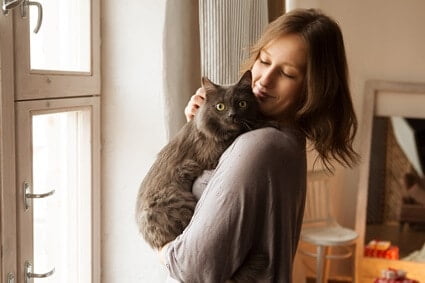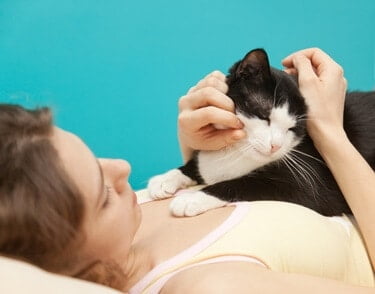One of the greatest pleasures of pet ownership is companionship. Bringing a cat into your home is a huge responsibility, countered by the joy of the animal’s camaraderie. Alas, some cats appear to ignore their owners.
If you meet all your cat’s needs as part of a daily routine, it’ll seek you out more often. Get into a set habit of feeding, treating, petting, and grooming your cat at set times. These activities will become the highlights of your cat’s day, and you’ll soon be able to rely on your cat wanting to spend more time with you.
Don’t take it personally if your cat doesn’t want to spend much time with you. Cats always march to the beat of their own drum. By providing everything that your cat needs, it’s likelier to seek you out.
Do Cats Like Spending Time with Humans?
Cats have a reputation as cold, aloof animals that are indifferent to their owners. That is a harmful myth. While cats are undeniably independent, that should not be confused with indifference to humans.
A study published in Behavioral Processes confirms that cats enjoy human contact, often more than eating. Anybody that has lived with a cat understands that this says a lot.
Alas, many humans still claim that their cat hates them, either in jest or with sincerity. Just because a cat doesn’t spend all day with you, it doesn’t mean that it dislikes spending time with you.
Does My Cat Like Spending Time with Me?
If your cat spends any time with you, it’s safe to assume that it enjoys your company. Cats don’t do anything that doesn’t suit them. If your cat approaches you for grooming or attention, you’re fine.
Signs that your cat enjoys spending time with you include:
- Approaching you for petting
- Purring in your company
- Grooming you, most notably licking your skin
- Bringing gifts (even if they are unwanted, such as a dead prey)
- Insisting on sleeping with you
Growing distressed when you leave the house isn’t necessarily a sign that your cat enjoys your company.
It’s more likely that your pet is experiencing separation anxiety. The Journal of the American Veterinary Medical Association outlines the symptoms of this concern, which include defecating on an owner’s bed.
My Cat is Spending Less Time with Me
There are many reasons why a cat may spend less time with an owner. Ask yourself the following questions to determine whether you may be responsible for your cat’s reluctance to spend time with you:
- Do you keep erratic or unreliable hours, struggling to keep to a strict schedule?
- Are you prone to handling your cat unnecessarily, often lifting it from the ground or handling it from behind?
- Do you only interact with your cat when it’s time to take a bath, visit the vet, or undertake other experiences a cat would find unpleasant?
- Is there any reason why your cat would associate you with loud noises, such as hoovering or raised voices?
- Has something about your living arrangements changed, such as a new person or animal moving into the home?
- Have you recently made any changes to yourself or your home, such as switching to a different perfume or getting new furniture?
These are all common reasons for a cat to spend less time with owners and primary homes. These issues can be resolved, as wherever possible, you should make an effort to do so. Rectifying these concerns will strengthen your bond with your cat.
Don’t instantly blame yourself if your cat is spending less time with you, though. As kittens grow into adult cats, they instinctively become more independent. Many cats also love to explore the wider world.
Reasons for cats to spend less time with owners include:
- Desire to hunt wild prey, such as birds or rodents
- Visiting other homes, which are quieter and offer preferred food or snacks
- Befriending other neighborhood animals and visiting them for recreation
- Entering a heat cycle (or reaching sexual maturity in males) and seeking the company of other cats to appease hormonal needs
While you cannot change a cat’s nature and instincts, you can make your home and company more appealing to a feline. With effort and patience, cats can be convinced to spend more time with their owners.
Convincing Your Cat to Spend More Time with You
In theory, it’s easy to make a cat want to spend more time with an owner. Just meet all their needs, all the time. Of course, this is easier said than done, especially when managing the desires of such fickle animals.
If you want to convince your cat to seek you out more often, take these steps:
- Let the cat approach you ask for attention, not the other way around.
- Keep your home accommodating for cats. That means maintaining an ideal temperature, offering space and territory, and avoiding loud, sudden noises
- Maintain a consistent, reliable schedule. Cats may not wear a wristwatch, but they tell the time in their own way. Your cat will expect food and attention at set times
- Keep a clean home and a neutral scent as much as possible. Cats dislike intense aromas or unclean surroundings, especially litter trays
- Help your cat satisfy their instincts and stimulate all five of their senses, but only when desired.
The golden rule that matters more than any other is spending quality time with a feline. This is the only way you’ll be seen as a reliable source of pleasure and thus worthy of attention.

How to Spend Quality Time with Your Cat
As discussed, cats won’t seek out human company for no reason. As an owner, it is your responsibility to provide a cat with quality time. There are four common ways that you can achieve this:
Play
Life doesn’t get much more enjoyable for cats than playing.
Play is not just about recreation, though. It’s an easy and fun way to convince your cat to exercise, which is especially important if you have an indoor cat.
Perhaps more importantly, playtime for felines satisfies instincts. Toys attached to strings, in particular, encourage a cat to stalk, pounce, and seek static prey.
If you can meet your cat’s natural needs, it will not look for other ways to do so.
Grooming and Petting
Petting can be a tricky activity with cats. Give too much attention, or lay hands on your cat without permission, and your cat will grow overstimulated. This can become painful and will result in clawing and biting.
If your cat approaches you, offer gentle petting. Always stroke or brush your cat softly, never working against the grain of the fur, and study for any reactions.
A contented cat that is enjoying the attention will remain still and purr softly. If your cat starts to stiffen up, unsheathes its claws, or changes verbalization, cease petting and let it free.
Hissing is an unmistakable sign of displeasure, but cats also purr to mask pain.
Eating
Cats love to imitate their owners and engage in the same habits. Eating together means that you can help your cat enjoy your company. Serve your cat’s dinner at the same time as you eat.
Don’t let your cat grow fussy, refusing to eat its dinner as it demands a share of yours. By synchronizing feeding times, your company will be actively sought out.
Exploring
As much as cats love routine, don’t confuse this with monotony. Cats can grow bored if they don’t experience new sights and smells. Going on an adventure with your cat can be a great way to spend time together.
Start by letting your cat show you around. If your cat is sniffing, scratching, and clawing at particular parts of the house, follow it and learn why. Your cat will appreciate you taking an interest in whatever has piqued its curiosity.
You can take this up an additional notch by exploring outside together. If your cat likes to roam the backyard, sit outside while it does so. If you have sufficient trust, you can eventually attach a leash and take your cat for a walk around the neighborhood.

How Much Time Should I Spend with My Cat?
As established, all cats have different needs. Some felines will be thrilled to spend every waking moment with their owners. Others will remain fiercely independent, only seeking human company at set times.
Human needs must also be taken into consideration. Anthrozoös explains how some people find living with a cat burdensome, while others will flourish from the company. Finding an appropriate balance, meeting the desires of owner and pet alike, is critical.
At the very least, most experts will recommend spending a minimum of 20 minutes with your cat on two separate occasions. These sessions should involve playtime if your cat is energetic and flexible enough. To reiterate, this is a minimum recommendation, not a doctrine.
How much time you should look to spend with your cat will depend on a range of factors. These include:
- Age – younger cats are likelier to seek out company, as are older cats that are a little more anxious and prone to illness
- Lifestyle – if your cat wanders outside, ensure you spend time with it. Otherwise, you risk regression to wild instincts
- Temperament – nervous cats will likely need a little more company than a confident, strong-willed feline
- Persona – you cannot change a cat’s general demeanor. Some felines will always be more independent or cantankerous than others
Cats judge time spent with humans on quality over quantity. Learning how to have fun with your cat means that you’re much likelier to enjoy a positive relationship, regardless of how many hours you spend in the same proximity.
Can I Spend Too Much Time with My Cat?
Moderation is key in all matters of cat ownership, including time spent together. If a cat never leaves your side, it can grow dependent on you. This will make the cat skittish, jittery, and clingy.
Animals confirm that cats can detect and understand human emotion. This is part of what makes the bond between owner and pet so strong. It can backfire, though. An anxious owner may imprint this anxiety upon a previously confident feline.
Only you will know if your relationship with your cat is healthy and functional. If you discover a sharp or sudden change in your pet’s demeanor, consider whether this is due to spending more time together. Your cat could be picking up on your emotions.
Don’t lose sight that cats are independent by nature and will always need some time alone. Feline companionship should never be a 24/7 arrangement. It’s healthy to spend a little time apart on occasion.
It may take time to convince a cat to spend time with you, and the process cannot be hurried. Trying to force a cat to enjoy your company will have the opposite effect. Show patience and understanding of your cat’s wishes and needs, and you’ll enjoy greater companionship.

